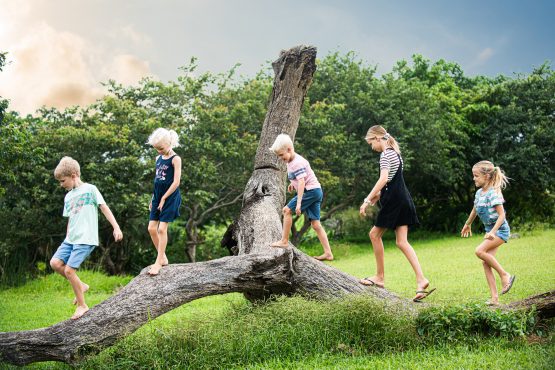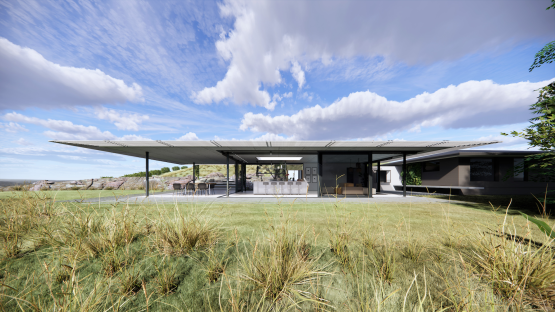SUREN NAIDOO: Hello, welcome to this special Property Podcast. The development boom on the KZN north coast continues, partly due to the semigration trend and more people now working remotely. Many new projects are in the works on this coastal area of South Africa, and one of the latest to be brought to market is Fairview Estates. It is located on an expansive track of farmland, and the development is focusing on traditional farm living, so a sort of farm-themed residential estate. ‘Fairview Estates’ is the original farm name.
On this podcast we are joined by Nic Jordan, the developer, to tell us more. Welcome to the podcast, Nic.
NIC JORDAN: Thanks Suren, and thank you for having me today.
SUREN NAIDOO: Nic, before we go to the topic of semigration, tell us a little bit more about Fairview Estates as a development. How was it attached, and what’s behind the farm-living theme, as it were.
NIC JORDAN: Thanks, Suren. I’ve been living on the estate here – well, the farm here – since I was six years old, and my family has been in the area. I think I’m fifth generation on the north coast in a farming environment.
We lived such a wonderful life here – which I was very fortunate to enjoy as a child and teenager, and beyond that [on] the sugarcane farm I took over from the family – that I started hatching this idea that I should make this available to more people to make farm living available.
I’ve got friends who always told me how they used to love coming out to the farm, and it happens to be a particularly attractive, beautiful farm.
On top of that, our locality is quite special. We are sort of 12/15 minutes from the beach, 50 minutes from King Shaka [International Airport], a couple of minutes from the N2, and just outside Ballito. So we are really well located. The potential is clearly there for people to live a life of being in town, but with the wonderful background of living and growing up on a farm.
SUREN NAIDOO: Just a little bit more insight – how large is the estate or the piece of land, and how many residential stands will it ultimately have? Also, what sort of overall investment are we looking at once fully complete?
NIC JORDAN: The estate itself is 480 hectares, and I think we might be the biggest estate on the north coast. Simbithi is probably the biggest after us, and the new Seaton Estate may be a similar size. But the other interesting thing about it, while they’re a couple of thousand homes as I understand it … [is that] Fairview will only have, when we get going – unless people subdivide later – about 96 properties.
The other interesting thing about it is they are registered agricultural farms. They’re not really residential at all. The minimum size is a two-hectare property which is 20 000 square metres.
I always like to put it in terms that people can recognise. That’s the equivalent of two rugby fields. So that’s a very unique offering we’ve got, [properties] that are essentially smallholdings in a gated estate. It’s so unique that I don’t think it’ll actually be repeated again, location-wise, with the size of properties we have so close to what is an exploding residential and advancing commercial town right on our doorstep.
SUREN NAIDOO: I didn’t have this as a question, but I would think within the context of the whole farm security [issue] in South Africa, that also is an advantage for Fairview Estate?
NIC JORDAN: Absolutely. In fact, we identified security as being our top priority when we started rolling out the estate.
In my original idea of smallholdings, I was going to have 15/20-hectare smallholdings and just have people sort out their security themselves.
We then identified that with farm security being such a sensitive subject in the country, we wanted to make sure the whole estate was entirely secure.
With the second phase that we brought in, we then went around and fenced the entire property. We’ve got a 12-kilometre perimeter fence. We’ve also taken that fence to a higher spec and level than you’ll find in most gated estates. We are very proud of our fence. I won’t go into detail here; it’s hard to explain. But essentially we’ve got a double layer of security, not because our area is unsafe.
[It’s] more just because of the perception of farming, and because the properties are slightly bigger; there’s a bit more space between the houses and farms and that.
We just identified that we wanted to make sure security is top-notch on the estate.

‘Friends always told me how they used to love coming out to the farm,’ says developer Nic Jordan, explaining the inspiration behind the development. Image: Supplied
SUREN NAIDOO: Thanks for that, Nic. Turning to semigration, how is Fairview Estates planning to leverage off this trend? Semigration is big in South Africa, particularly to the KZN north coast and several towns in the Western Cape. It was happening in South Africa even pre-Covid.
NIC JORDAN: Yes, absolutely. It’s been so interesting to watch the development of Ballito over the last eight years.
It was probably around that sort of period we started getting more and more people moving down from Joburg and, as we call it these days, semigrating – and some guys literally moving and relocating and building businesses here, and other guys commuting for a day or two each week, or a couple of days a month, to Joburg for their business, but having that advantage of our very short commute time of one hour between Joburg and Durban, and obviously the advantage of what I believe is the most magnificent corner for living in the world.
I’ve done a fair bit of travelling. I’m not going to pretend I’ve been to every potential place, but I’ve actually yet to find a place that I would like to live in that offers as much as our little corner of the north coast does.
SUREN NAIDOO: Now that we are kind of post-Covid, many would say the pandemic has accelerated the whole work-from-home and remote-working trend too. I guess that bolsters the whole concept of semigration and what you are trying to achieve with your new development there, and maybe leveraging off it.
NIC JORDAN: In fact, I think it goes even further than that. Work-from-home has become a much more acceptable way of existing. I think there are many guys I spoke to just now who used to commute to Joburg and who have now dropped two or three of the monthly commutes, depending on what they were doing, and doing more online, where I think they wouldn’t have got away with it, or it was less sort of common or acceptable to do that. Now everyone’s much more open to online meetings, etc, and working remotely.
But it goes to another level which we realised with Covid and, dare I say, our failing municipal structures these days, where our estate is going to be very much off-grid.
We currently do depend on external electricity from KwaDukuza, our local municipality, with obviously Eskom electricity, but we are working hard without promising anything yet – because it’s not finalised – on a solar farm to supply the estate. That’s one of the next products we’re going to be looking at developing into the estate.
Our domestic water is all borehole-fed and internal. We even provide irrigation to the farms. We’ve got an allotment which we give to each of the properties. So now we slowly start getting away from dependency. The last thing was septic tanks that are all on the properties, as opposed to relying on sewerage from service providers.
The other advantage [that] comes out of this is a whole element of self-sufficiency which is wonderful in times such as Covid, when there’s panic buying and whatever else is going on.
So [there’s] the joy and the luxury of being able to grow your own vegetables in the garden, doing it organically, or biologically as we call it, keeping chickens. We’ve got 10 chickens in the garden. We collect eggs from them every day; all our kitchen scraps go there.

A wholesome back-to-nature style of living is the ethos of the estate. Image: Supplied
We actually coined a phrase for Fairview called ‘artisanal living’, and it describes that sort of back-to-nature, back-to-roots wholesome living that is the ethos of our estate.
Covid, I think, highlighted that too. We all want to be eating our produce close to home [with] as much coming from the garden as possible, and not depending on shops and suppliers of these things.
SUREN NAIDOO: Well, you are a farmer. I’m sure you are close to nature, but it also has a sustainability aspect there. It’s not necessarily an ESG [environmental, social, governance] thing for you. What you mentioned there was very interesting because I had a question around the whole self-sustainability [aspect] and that sort of thing. On that topic we’ll come back to semigration and the location.
I see on your website you talk about macadamia nut cultivation as a possibility as well, to get some income on the side if you are an investor there.
NIC JORDAN: Yes, that’s correct. It’s a great initiative we started up with my partners. We established a macadamia co-op called Fairview Macadamia Co-op.
The role of the co-op is to enable farmers to come onto the estate. So a farmer could buy a two-hectare site and, provided he can fit one hectare as a minimum size of macadamias, he will get all the cost-effectiveness of a commercial farm through the co-op, which is obviously run at cost. And the co-op with a highly skilled farmer or farm manager will run his one-hectare site for him as part of a big operation.
I think we [have] currently 50 or 60 hectares of macadamias already in the ground, and many of our farmers have gone for that reward. We call them ‘farmers’; they are obviously farm owners and some will be farmers through the co-op, and some will be farmers in their own right if they want to do something else, and many of them are just farm owners in that they may just have a house and enjoy the grounds of a two-hectare site.
But it’s been a wonderful opportunity and it’s surprised me how well taken up it was. I think there’s something people love about [it].
There’s a natural call we all have towards farming and a farm lifestyle. It’s almost instinctive in all of us.
And the macadamia co-op has enabled people, without becoming experts in farming and having to learn all about farming macs, to unlock that in their own yard.
Obviously, the potential of earning some significant revenues, which will contribute to the living expenses over the years, is a great advantage and incentive for everybody.
SUREN NAIDOO: That is very innovative. Going back to semigration – a key driver of the boom on the KZN north coast and semigration to this part of the world is the development of King Shaka International Airport, which opened in 2010. Perhaps you want to talk a little bit more about this and the location of the estate in the context of King Shaka and the boom town of Ballito?
NIC JORDAN: Thanks, Suren. I think King Shaka [airport] certainly did have a big role to play in the booming of Ballito. Ballito was named by AfrAsia [in] SA’s Wealth Report in 2019 as the fasted-growing wealth market in South Africa.
The advantage of having the airport so close is it’s only a 50-minute drive door to door if I go to the airport now. It’s right on our doorstep. It has been a catalyst for a lot of industry and business in the area and Ballito itself, the whole access to the N2.
The other thing that has changed in Ballito is that industry has boomed in the area. There are many people moving up, even from Durban, coming north now.
Probably 15 years ago if I needed some tractor spares or something like that I’d have to head off to Durban for some parts. Now we’ve got every service industry right on our doorstep, and it’s made an amazing difference to doing business and operating on the north coast.

Catch-and-release fishing opportunities abound. Image: Supplied
SUREN NAIDOO: Definitely supporting the whole boom from a commercial property perspective there.
Nic, going back to your website, one of the other things I saw was the interesting mention – and you already mentioned at the beginning of the interview – that the developers, including yourself, are staying on the estate or plan to stay if you are not already there.
Who are your partners? Perhaps you want to talk about this and what’s behind that, because it’s not a case of buying into it; you’re already part of it.
NIC JORDAN: Yes. It’s always been my intention to develop the estate around where I live. I’ve retained a 20-hectare site in the middle of the estate, and I’ve already got some macadamias on it through the co-op, and I’ll be doing more as I remove the sugarcane, which is what’s on there currently.
My partners purchased one of the first 20-hectare sites in our first phase, and they loved it so much they negotiated to purchase a small farm next door, and then approached me to ask if they could join into the estate as they were just so impressed with the sort of concept that I’d come up with.
So my partners, Nick Leitch and Liesl Venter, have been a massive part in the success of the estate and developing us to where we are now with the concepts and everything that I started.
They also are absolutely going to be living in the estate. It’s an unusual thing, I’m told.
I’m still not used to the ‘developer’ title. I always think of myself as a farmer, but I’m told developers don’t often want to live in their developments in the long term, but this is contrary [to that].
We are all very excited about living here and building an ethos and a culture of the people who’ve followed us into the estate and invested in our sort of aspirations and dreams, which is one where we want to live for the rest of our lives and have our kids come and live here with their kids.
It’s definitely a long-term interest we have.
It’s not just a money-making business, if I can put it like that.
SUREN NAIDOO: Nic, what will make Fairview different from other farm-themed estates? I suppose you’ve already highlighted some of this, but not just what will make it different or what makes it different. What are some of the other facilities planned – either for the estate or [how] people buying in will benefit from the surrounding area?
NIC JORDAN: The north coast has such a wonderful climate. We are also very fortunate to have Holla Trails [mountain biking and running] on our doorstep.
In fact, the trails come through the estate. That’s part of the offering we have, and they curate the trails here. So our whole lifestyle [on the] north coast is very much outdoors. Nobody entertains indoors. We always sit here on our verandas or lawns, and it’s a very active lifestyle that everyone has here.
The other unique thing about Fairview is that I like to sort of think of us as what Sandton was 20 years ago. I’m told that Sandton was originally a farm and there was nothing there.
In our MoI [memorandum of incorporation] on Fairview, the zoning must remain agriculture. It can’t be changed, unless by a majority vote of 75% of the membership.
So this will always be agricultural zoning.

The estate is very focused on the joys of outdoor living. Image: Supplied
The minimum size that someone could go down to is one hectare, and more than likely be forced to stay at two hectares, just because there’s not much benefit in going smaller.
So we are forever going to be these large properties right on the edge of a well-developed area with all the services. But you would hardly know it; we are in the little valleys and the farms [extend] down to the stream or in the forest.

The property has two dams, little valleys, a forest, and a stream. Image: Supplied
You wouldn’t even know that you are sort of in the heart of all these commercial facilities around you because you’ve got this unique little quiet spot in the middle of the countryside, on a small farm.
With our location and climate, I don’t see this ever being repeated, even within 50 kilometres [from] here. I don’t see any farm or property that could match what we’ve done. I don’t think it can happen again. Someone might prove me wrong, but I think it’s totally unique.
There’s a lovely saying that there’s only so much beachfront property that’s ever made, and that you can never go wrong buying beachfront, even if it’s at a premium. I think a similar thing applies here – that there’s only going to be so many farming estates in the country, and I don’t believe there’ll be any more in our immediate vicinity on the north coast, which makes it a wonderful aspiration to grab a hold of while it’s available. It’s going to be unique, an absolutely unique estate once we complete it – and it already is.
SUREN NAIDOO: Nic, I’ve mentioned that Fairview has just come to market, but there has been an initial phase. What’s the rollout plan for the next phase, and what has the interest been in the estate itself from an investor perspective?
NIC JORDAN: Yes, Suren. Thanks for that. It’s an interesting one. The first phase was originally going to be 15/20-hectare sites. As I said, I took six of them out of that and I re-subdivided to make these smaller ones, and we added in my partners’ property.
The result is there are 96 properties on the estate. The first phase was sold out; those nine 20-hectare sites were sold out. We are now 65% sold out on our second phase.
Some of the properties aren’t available yet, so the nice thing for people who are going to have a look and see if this is something that they would like to aspire to, is we have some properties which will still be held back in the second phase while I’ve a compost operation which I’ve got to close to vacate some of the sites. I’ve got two old quarries I need to rehabilitate, which will become sites. So there are about 11 sites which aren’t going be available for another year to 18 months.
We’ve actually been blown away by the response to what we’re offering. There’s no question it’s a very aspirational way of living, and we’ve seen that from our buyers.
What surprised us is that we expected more Joburg people to come through.
Yet in the early days – and I suppose it might have been influenced by Covid and people travelling a bit less – we were so surprised at how many local people were already resident in the Ballito area, in some of the estates locally, who were our first adopters.
Having thought about it for a bit, I think it’s because they understood the product. They’ve seen it [while] cycling and running through on the trails. They know where we are. They understand what it means to be this close, just outside Ballito, whereas in earlier days people from further afield see a farm outside Ballito, and [wonder] what that means. It’s 20km away – is it 30 minutes’ drive?
But after that we are now seeing a lot more Johannesburg people coming and choosing this as their place to relocate from Joburg. There seems to be a bit of a run on Joburg at the moment. I don’t know if you are seeing that living up there.
SUREN NAIDOO: Well, there has been talk about it, but I think also that semigration [is a factor], where maybe the family is there and the dad or the mum is transiting between Ballito or the north coast and Johannesburg.
Nic, we will have to leave it there. That was Nic Jordan, the developer behind Fairview Estates.
Brought to you by Fairview Estates.
Moneyweb does not endorse any product or service being advertised in sponsored articles on our platform.
Stay connected with us on social media platform for instant update click here to join our Twitter, & Facebook
We are now on Telegram. Click here to join our channel (@TechiUpdate) and stay updated with the latest Technology headlines.
For all the latest Business News Click Here
For the latest news and updates, follow us on Google News.
